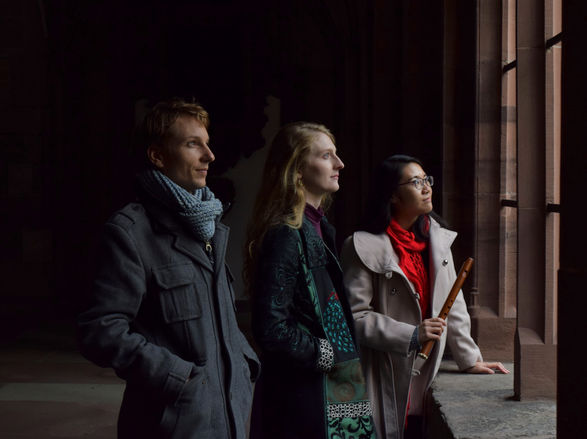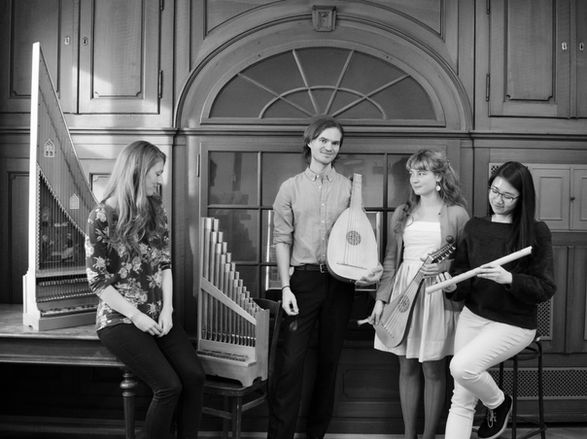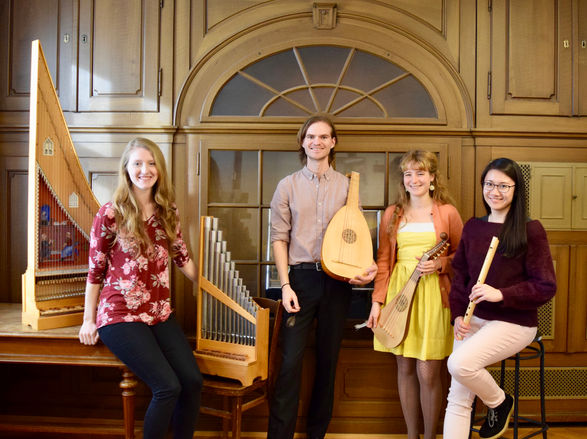
Amy & Fiona

The founders of ensemble La Fiamma, Fiona Kizzie Lee and Amy Farnell, met in 2017 while studying medieval and renaissance music at Schola Cantorum Basiliensis, under the tutelage of renowned professors such as Corina Marti, Katarina Livljanić, Marc Lewon, and Baptiste Romain. Their common stylistic pursuits and tastes, along with their love of sightreading, brought them together for so many academic collaborations that they eventually developed their own ensemble outside of the Schola. La Fiamma demands, as the name suggests, the spark, or flame, of musical performance, and provides innovative and even experimental renditions of early music, playing with notions of modern aesthetics and old-world aesthetics.
Both Fiona and Amy play a spectrum of musical instruments, including recorder, medieval keyboards, pipe and tabor, shawm, dulcian and the voice. With the eventual collaboration of other musicians, they began to create performances on a larger scale: Lutenist John Martling and singer Julia Marty joined La Fiamma team for a program of German music from the 14th-15th centuries, making it to the semi-finals of the International Van Wassenaer Competition in August 2019; In 2020 and 2021, Swiss singer Matthieu Romanens joined Fiona and Amy for a series of winter concerts of English carols around Germany and Switzerland; In 2020, the duo collaborated with recorder players Akine Fukai and Helen Glock for a program in Basel on the works of Bonifacius Amerbach; In May 2021, they joined Ann Allen to perform some medieval Italian repertoire in her concert series MUSIC//BAR//NONE; in May 2021, Julia Marty joined La Fiamma again for a concert at the “Lange Nacht der Kirchen” series in Basel’s Reformierte Kirche Münchenstein; And in July 2021, singer Beatrice Dunoyer and Corina Marti joined La Fiamma for Basel’s “Ökumenisches Abendgebet für die Stadt Basel.
Back in 2020, Fiona and Amy had to get creative like the rest of the world, and started a YouTube channel dedicated to the performance and education of medieval and renaissance music, offering space for collaborations with Corina Marti, Julia Marty, Ann Allen, Darina Ablogina, Sebastian Mitra, and Father Benedikt Locher. They have since been asked to lead a workshop and concert at the Leysin American School in Leysin, Switzerland with singer Grace Newcombe, double-reed and recorder player Ann Allen, trombonist Tin Cugelj, and lutenist Rui Staehelin. They will introduce early music to the students and the community of Leysin in the workshop and collaborate with them for a concert of a variety of early music, from chant all the way to late renaissance polyphony.
Amy Farnell
Voice
Early music specialist and mezzo-soprano Amy Farnell held music degrees from Baylor University (2015) and the University of Birmingham England (2017) before seeking earlier music studies in Switzerland at Schola Cantorum Basiliensis, where she has since received three degrees in medieval and renaissance vocal performance and ensemble leading. With various colleagues from Schola Cantorum, Amy has sung for a variety of early music ensembles – La Fiamma, Contre le Temps, Q.p.i.t., La Cetra Vokalensemble, Re-Renaissance Basel, and Ensemble Equaliter – and through them has performed at the York Early Music Competition, the International Van Wassenaer Competition, Utrecht Early Music Festival’s Fabulous Fringe Series, Musikfestival Bern, Enchanté Festival Riehen, an historical wedding recreation in the Duomo di Milano in 2019, and more.
Her enjoyment of teamwork, exploration of musical styles, early music specialty, and tonal stability has also landed her a regular spot in larger and more modern ensembles with repertoires spanning from chant to newly composed works – regularly appearing in concerts with groups such as The Zurich Chamber Singers, Verba vocalis, Junger Kammerchor Basel, and Ad Parnassum Productions, and often aiding in their performance of chants. She has also challenged herself artistically through founding her own ensemble, Quod Balensi, in 2018; based in Texas, this vocal ensemble performs mainly renaissance music, with the goal of introducing European art in America through the lens of storytelling.
Amy was recently a part of several CDs by The Zurich Chamber Singers – Bruckner Spectrum (2022), Les comptines de l’Oiselier (2021), O Nata Lux (2020) – and is scheduled to appear in upcoming CDs by Quod Balensi, La Fiamma, and Contre le Temps. Outside of performing as a vocalist, Amy is hired as a social media manager, administrator, and early music clinician. She is the editor of The Chorister, the magazine of the nonprofit choral music publisher Choristers Guild, and is also their music licensing and permissions specialist.
.jpeg)

Fiona Kizzie Lee
Recorder, Medieval/ Renaissance Keyboards, Pipe and Tabor
B.A. in Music (Hons.), CUHK; MMus., King's College London
MPAM (Medieval Music) & SPAM (Renaissance Music), Schola Cantorum Basiliensis.
FRSM (Dist.); LRSM (Dist.); LTCL (Dist.)
Specialising in Medieval and Renaissance Music, Recorder and Keyboard Player Fiona Kizzie Lee performs as a soloist and co-directs many early music ensembles in Basel and Hong Kong.
Fiona Kizzie Lee was born in Hong Kong in 1994. Having graduated with first class honours at the Chinese University of Hong Kong (Music, undergraduate), she first pursued a Masters in Musiocology (Distinction) in London under the support of the Jockey Club Music and Dance Fund 2016/17 and then decided to move to Basel to further her studies specifically in early music performance, earning a Master’s degree in Performance of Medieval Music (Distinction, 2019) and a Specialised master’s degree in Renaissance Music (Distinction, 2021) in the class of Corina Marti.
Fiona Kizzie Lee performs internationally as a soloist and as an ensemble performer. She co-directs Ensemble Pampinea (with Maruša Brezavšček), which won the first prize of the London Early Music Young Ensemble Competition in November 2022. She also co-directs Ensemble .q.p.i.t. and Ensemble La Fiamma, which were selected as finalist and semi-finalist in the International Young Artists Competition in York, England (2019) and the Internationaal Van Wassenaer Concours in Utrecht, Netherlands (2019) respectively.
As a researcher she is now reading a Doctorate in Musicology at the University of Zürich. Her project is on 15th-century German Organ tablatures, funded by the UZH Candoc Grant and the Start-Up Grant from the Graduate school of UZH.










